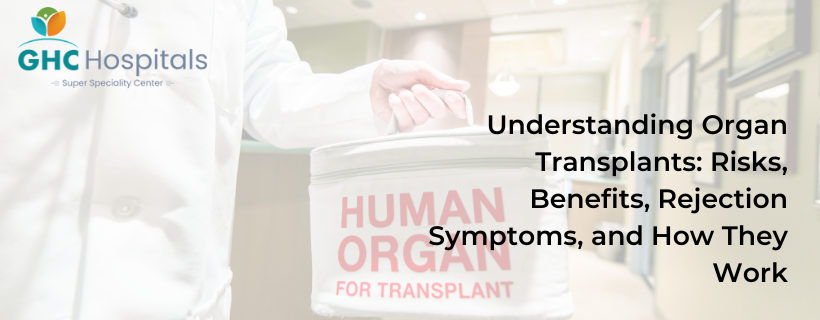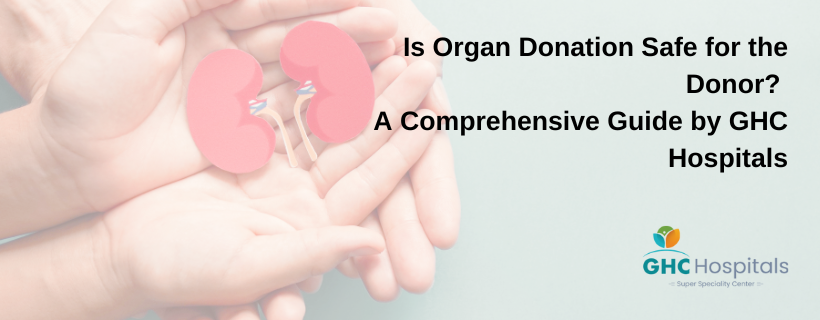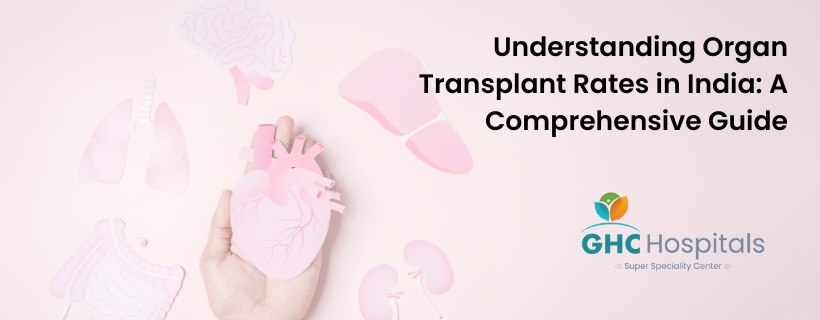Organ transplants are a remarkable medical advancement that can save and significantly improve lives. At GHC Hospitals, a leading multispecialty hospital, we’re dedicated to providing patients with comprehensive information about this critical procedure. In this article, we’ll explore the risks and benefits of organ transplants, the symptoms of organ transplant rejection, treatment options, and an overview of how organ transplants work.
What is an Organ Transplant?
An organ transplant involves replacing a diseased or failing organ with a healthy one from a donor. This procedure is typically performed when an organ no longer functions properly and cannot be treated with other medical interventions. Commonly transplanted organs include the heart, kidneys, liver, lungs, and pancreas.
Benefits of Organ Transplants
- Life-Saving Procedure: The most significant benefit of an organ transplant is that it can save a patient’s life. For patients with end-stage organ failure, a transplant may be the only viable treatment option.
- Improved Quality of Life: For many patients, receiving a healthy organ means a dramatic improvement in their quality of life. They can resume normal activities, experience reduced symptoms, and enjoy better overall health.
- Long-Term Survival: With advancements in medical technology and post-transplant care, many organ transplant recipients experience long-term survival and can live for many years post-transplant.
- Treatment for Chronic Conditions: Organ transplants can be an effective treatment for chronic conditions such as kidney failure, liver cirrhosis, and heart failure, offering patients a new lease on life.
Risks Associated with Organ Transplants
While organ transplants offer numerous benefits, they also come with certain risks:
- Surgical Complications: Like any major surgery, organ transplants carry the risk of complications such as infection, bleeding, and reactions to anesthesia.
- Organ Rejection: One of the most significant risks of an organ transplant is the possibility of organ rejection. This occurs when the recipient’s immune system attacks the transplanted organ, mistaking it for a foreign invader.
- Side Effects of Immunosuppressants: To prevent organ rejection, patients must take immunosuppressant medications for the rest of their lives. These medications can have side effects, including increased susceptibility to infections, weight gain, and increased risk of certain cancers.
- Long-Term Health Risks: Some transplant recipients may develop long-term health issues such as diabetes, high blood pressure, or kidney damage as a result of the surgery or the immunosuppressive therapy.
Symptoms of Organ Transplant Rejection
Organ rejection can occur at any time after the transplant, even years later. It’s crucial for transplant recipients to be aware of the symptoms of organ rejection, which can vary depending on the organ involved:
- Kidney Transplant Rejection: Symptoms may include decreased urine output, swelling, weight gain, fever, and high blood pressure.
- Liver Transplant Rejection: Symptoms may include jaundice (yellowing of the skin and eyes), dark urine, fatigue, nausea, and abdominal pain.
- Heart Transplant Rejection: Symptoms may include shortness of breath, fatigue, weight gain, and swelling in the legs or abdomen.
- Lung Transplant Rejection: Symptoms may include coughing, shortness of breath, fever, and fatigue.
Treatment for Organ Transplant Rejection
If organ rejection is suspected, immediate medical attention is required. Treatment typically involves adjusting the dose of immunosuppressant medications or adding new medications to better control the immune system’s response. In some cases, a biopsy of the transplanted organ may be necessary to confirm rejection and guide treatment.
How Does Organ Transplant Work?
The process of organ transplantation involves several steps:
- Evaluation and Listing: Patients with end-stage organ failure are evaluated by a transplant team to determine their eligibility for a transplant. If eligible, they are placed on a transplant waiting list.
- Donor Matching: When a suitable donor organ becomes available, it is matched with a recipient based on factors such as blood type, tissue type, and organ size.
- Transplant Surgery: Once a match is found, the recipient undergoes surgery to receive the donor organ. The surgical team at GHC Hospitals uses advanced techniques to ensure the best possible outcome.
- Post-Transplant Care: After the surgery, recipients are closely monitored for signs of organ rejection and other complications. Lifelong immunosuppressive therapy is required to prevent rejection.
Conclusion
Organ transplants are a life-saving option for patients with severe organ failure. Understanding the risks, benefits, and the process of organ transplants is essential for anyone considering this procedure. At GHC Hospitals, we’re committed to providing the highest level of care and support to our transplant patients, ensuring they receive the best possible outcome.
If you have any questions about organ transplants or need more information, please visit GHC Hospitals or consult with our expert medical team. Your health and well-being are our top priority.




